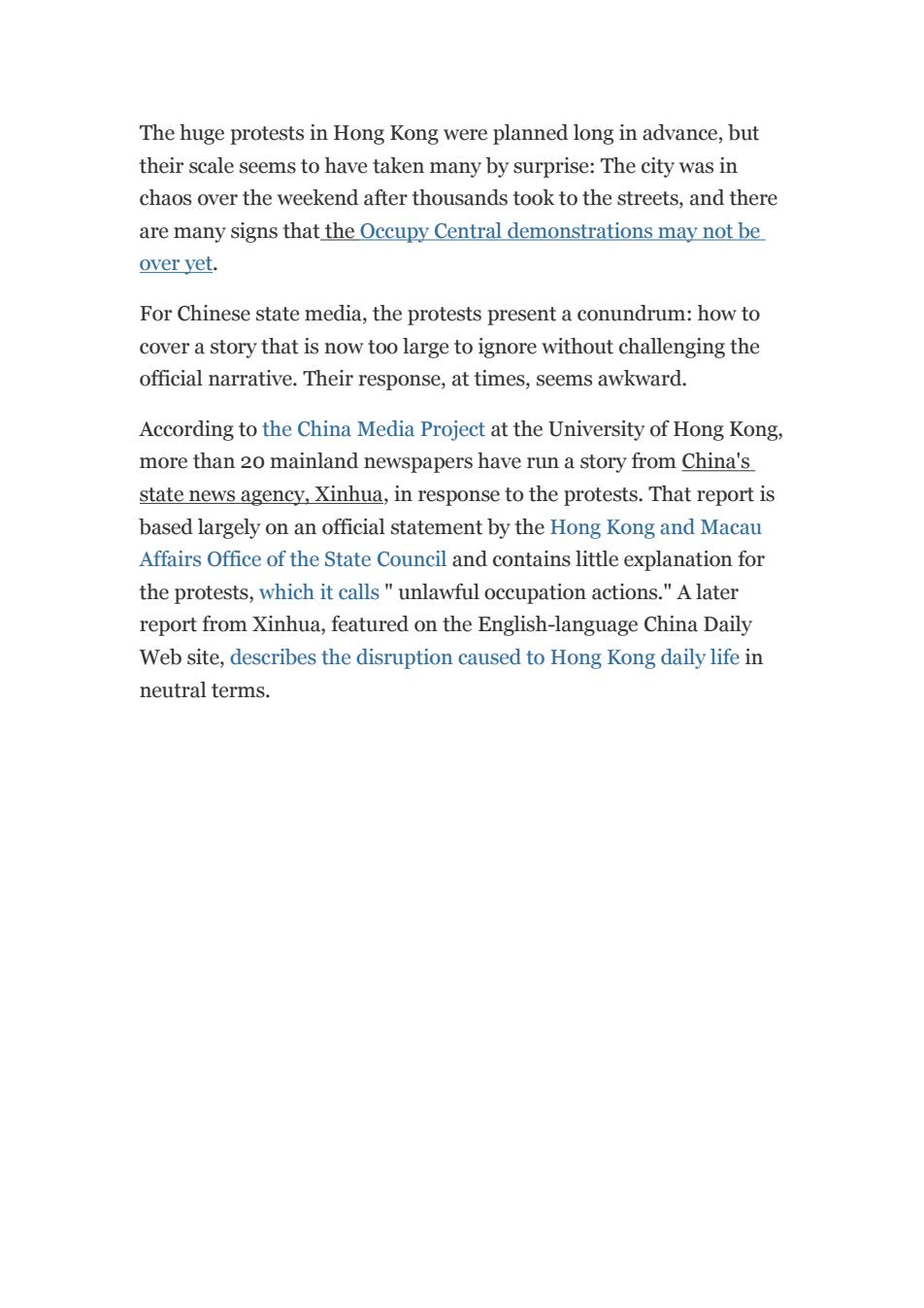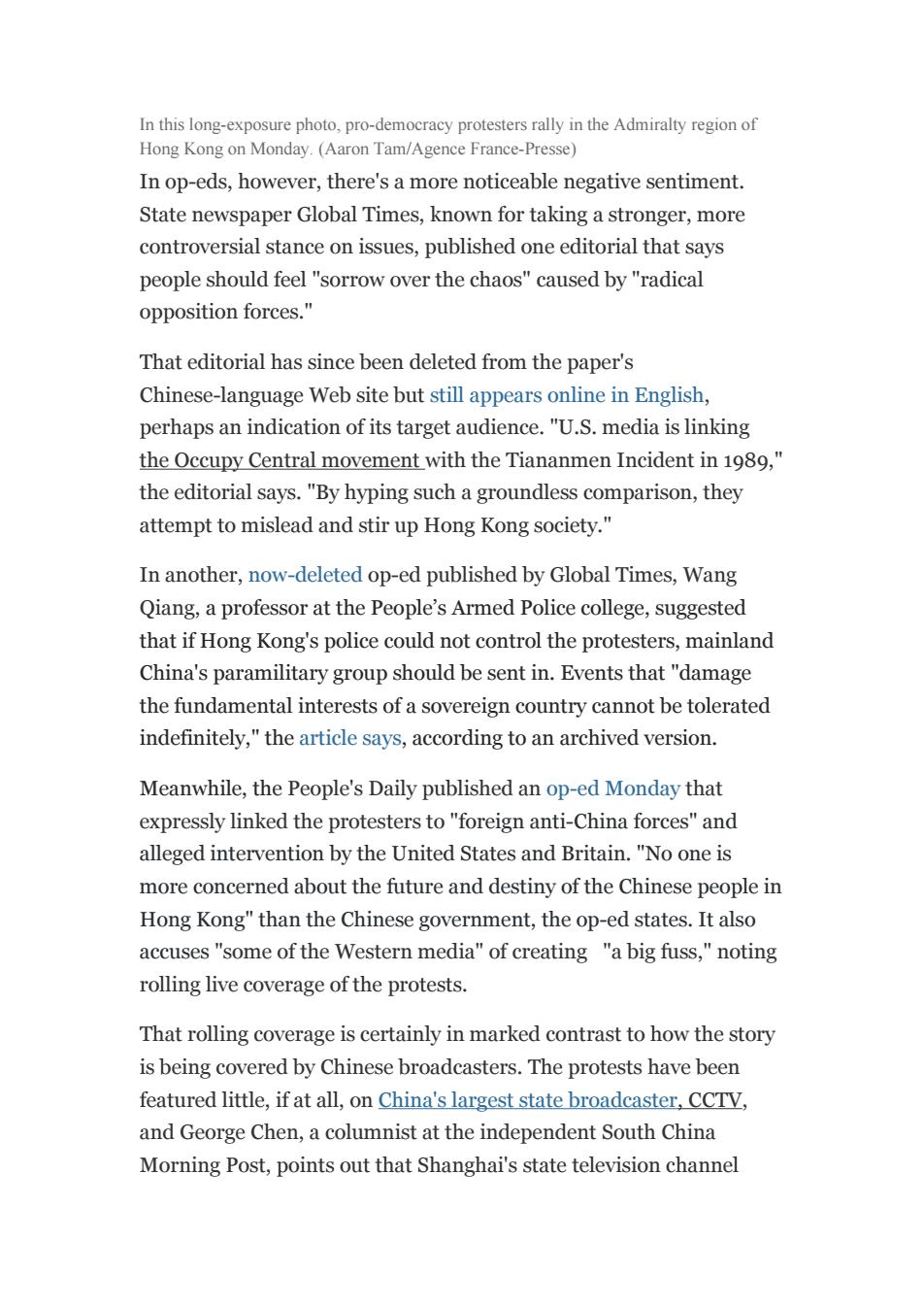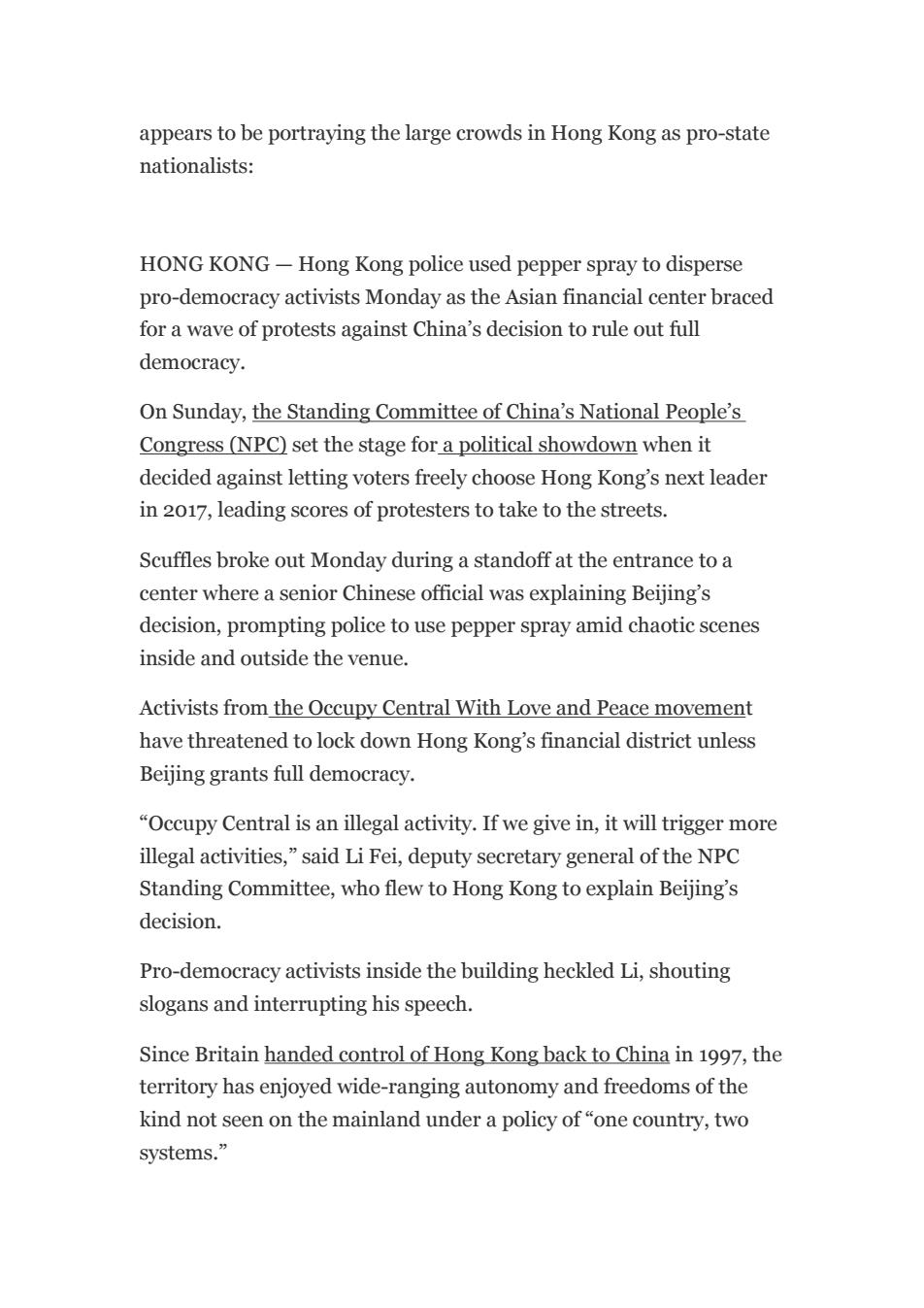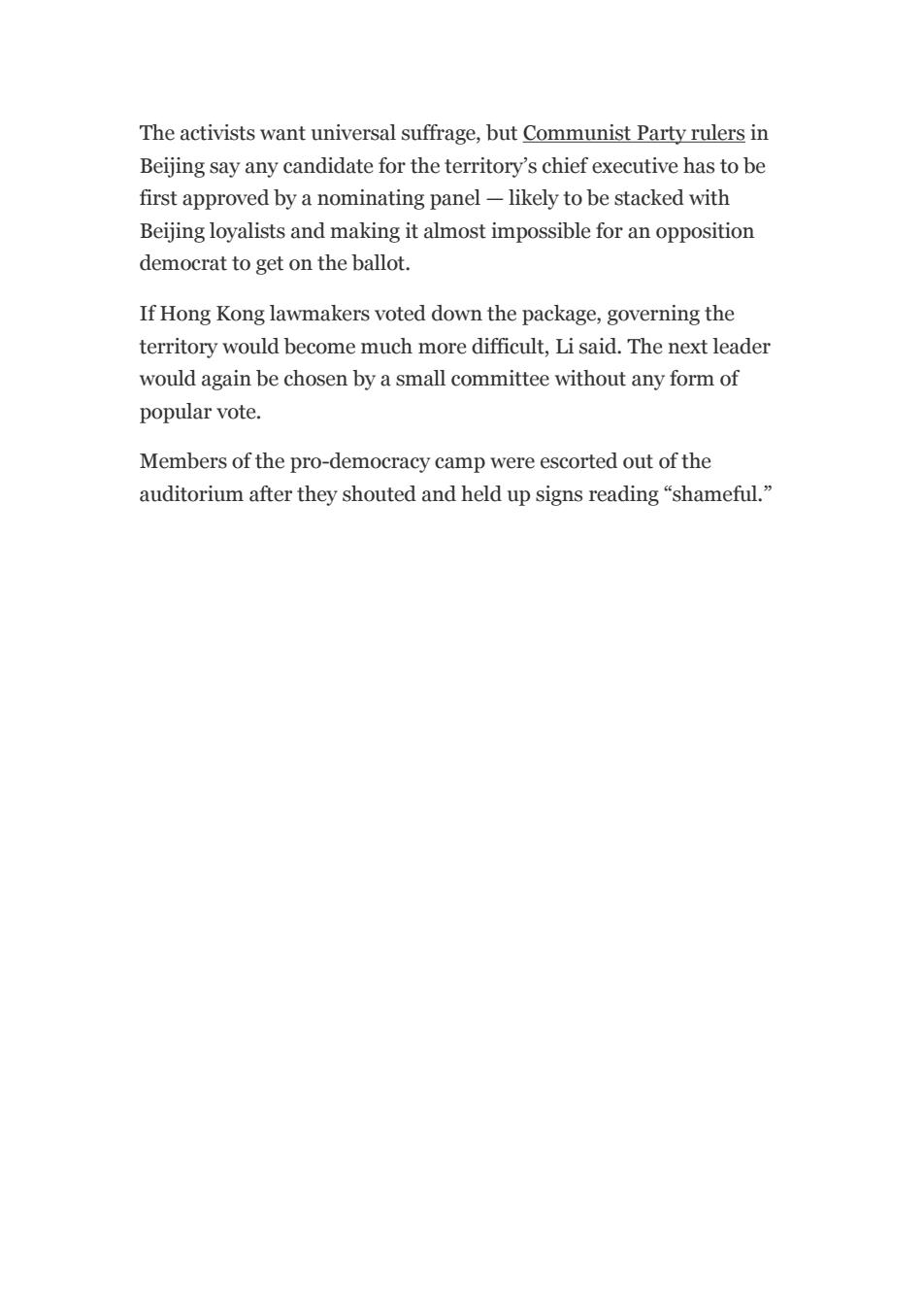
The huge protests in Hong Kong were planned long in advance,but their scale seems to have taken many by surprise:The city was in chaos over the weekend after thousands took to the streets,and there are many signs that the Occupy Central demonstrations may not be over yet. For Chinese state media,the protests present a conundrum:how to cover a story that is now too large to ignore without challenging the official narrative.Their response,at times,seems awkward. According to the China Media Project at the University of Hong Kong, more than 20 mainland newspapers have run a story from China's state news agency,Xinhua,in response to the protests.That report is based largely on an official statement by the Hong Kong and Macau Affairs Office of the State Council and contains little explanation for the protests,which it calls"unlawful occupation actions."A later report from Xinhua,featured on the English-language China Daily Web site,describes the disruption caused to Hong Kong daily life in neutral terms
The huge protests in Hong Kong were planned long in advance, but their scale seems to have taken many by surprise: The city was in chaos over the weekend after thousands took to the streets, and there are many signs that the Occupy Central demonstrations may not be over yet. For Chinese state media, the protests present a conundrum: how to cover a story that is now too large to ignore without challenging the official narrative. Their response, at times, seems awkward. According to the China Media Project at the University of Hong Kong, more than 20 mainland newspapers have run a story from China's state news agency, Xinhua, in response to the protests. That report is based largely on an official statement by the Hong Kong and Macau Affairs Office of the State Council and contains little explanation for the protests, which it calls " unlawful occupation actions." A later report from Xinhua, featured on the English-language China Daily Web site, describes the disruption caused to Hong Kong daily life in neutral terms


In this long-exposure photo,pro-democracy protesters rally in the Admiralty region of Hong Kong on Monday.(Aaron Tam/Agence France-Presse) In op-eds,however,there's a more noticeable negative sentiment. State newspaper Global Times,known for taking a stronger,more controversial stance on issues,published one editorial that says people should feel"sorrow over the chaos"caused by"radical opposition forces." That editorial has since been deleted from the paper's Chinese-language Web site but still appears online in English, perhaps an indication of its target audience."U.S.media is linking the Occupy Central movement with the Tiananmen Incident in 1989," the editorial says."By hyping such a groundless comparison,they attempt to mislead and stir up Hong Kong society." In another,now-deleted op-ed published by Global Times,Wang Qiang,a professor at the People's Armed Police college,suggested that if Hong Kong's police could not control the protesters,mainland China's paramilitary group should be sent in.Events that "damage the fundamental interests of a sovereign country cannot be tolerated indefinitely,"the article says,according to an archived version. Meanwhile,the People's Daily published an op-ed Monday that expressly linked the protesters to "foreign anti-China forces"and alleged intervention by the United States and Britain."No one is more concerned about the future and destiny of the Chinese people in Hong Kong"than the Chinese government,the op-ed states.It also accuses "some of the Western media"of creating "a big fuss,"noting rolling live coverage of the protests. That rolling coverage is certainly in marked contrast to how the story is being covered by Chinese broadcasters.The protests have been featured little,if at all,on China's largest state broadcaster,CCTV, and George Chen,a columnist at the independent South China Morning Post,points out that Shanghai's state television channel
In this long-exposure photo, pro-democracy protesters rally in the Admiralty region of Hong Kong on Monday. (Aaron Tam/Agence France-Presse) In op-eds, however, there's a more noticeable negative sentiment. State newspaper Global Times, known for taking a stronger, more controversial stance on issues, published one editorial that says people should feel "sorrow over the chaos" caused by "radical opposition forces." That editorial has since been deleted from the paper's Chinese-language Web site but still appears online in English, perhaps an indication of its target audience. "U.S. media is linking the Occupy Central movement with the Tiananmen Incident in 1989," the editorial says. "By hyping such a groundless comparison, they attempt to mislead and stir up Hong Kong society." In another, now-deleted op-ed published by Global Times, Wang Qiang, a professor at the People’s Armed Police college, suggested that if Hong Kong's police could not control the protesters, mainland China's paramilitary group should be sent in. Events that "damage the fundamental interests of a sovereign country cannot be tolerated indefinitely," the article says, according to an archived version. Meanwhile, the People's Daily published an op-ed Monday that expressly linked the protesters to "foreign anti-China forces" and alleged intervention by the United States and Britain. "No one is more concerned about the future and destiny of the Chinese people in Hong Kong" than the Chinese government, the op-ed states. It also accuses "some of the Western media" of creating "a big fuss," noting rolling live coverage of the protests. That rolling coverage is certainly in marked contrast to how the story is being covered by Chinese broadcasters. The protests have been featured little, if at all, on China's largest state broadcaster, CCTV, and George Chen, a columnist at the independent South China Morning Post, points out that Shanghai's state television channel

appears to be portraying the large crowds in Hong Kong as pro-state nationalists: HONG KONG-Hong Kong police used pepper spray to disperse pro-democracy activists Monday as the Asian financial center braced for a wave of protests against China's decision to rule out full democracy. On Sunday,the Standing Committee of China's National People's Congress (NPC)set the stage for a political showdown when it decided against letting voters freely choose Hong Kong's next leader in 2017,leading scores of protesters to take to the streets. Scuffles broke out Monday during a standoff at the entrance to a center where a senior Chinese official was explaining Beijing's decision,prompting police to use pepper spray amid chaotic scenes inside and outside the venue. Activists from the Occupy Central With Love and Peace movement have threatened to lock down Hong Kong's financial district unless Beijing grants full democracy. "Occupy Central is an illegal activity.If we give in,it will trigger more illegal activities,"said Li Fei,deputy secretary general of the NPC Standing Committee,who flew to Hong Kong to explain Beijing's decision Pro-democracy activists inside the building heckled Li,shouting slogans and interrupting his speech. Since Britain handed control of Hong Kong back to China in 1997,the territory has enjoyed wide-ranging autonomy and freedoms of the kind not seen on the mainland under a policy of"one country,two systems
appears to be portraying the large crowds in Hong Kong as pro-state nationalists: HONG KONG — Hong Kong police used pepper spray to disperse pro-democracy activists Monday as the Asian financial center braced for a wave of protests against China’s decision to rule out full democracy. On Sunday, the Standing Committee of China’s National People’s Congress (NPC) set the stage for a political showdown when it decided against letting voters freely choose Hong Kong’s next leader in 2017, leading scores of protesters to take to the streets. Scuffles broke out Monday during a standoff at the entrance to a center where a senior Chinese official was explaining Beijing’s decision, prompting police to use pepper spray amid chaotic scenes inside and outside the venue. Activists from the Occupy Central With Love and Peace movement have threatened to lock down Hong Kong’s financial district unless Beijing grants full democracy. “Occupy Central is an illegal activity. If we give in, it will trigger more illegal activities,” said Li Fei, deputy secretary general of the NPC Standing Committee, who flew to Hong Kong to explain Beijing’s decision. Pro-democracy activists inside the building heckled Li, shouting slogans and interrupting his speech. Since Britain handed control of Hong Kong back to China in 1997, the territory has enjoyed wide-ranging autonomy and freedoms of the kind not seen on the mainland under a policy of “one country, two systems

The activists want universal suffrage,but Communist Party rulers in Beijing say any candidate for the territory's chief executive has to be first approved by a nominating panel-likely to be stacked with Beijing loyalists and making it almost impossible for an opposition democrat to get on the ballot. If Hong Kong lawmakers voted down the package,governing the territory would become much more difficult,Li said.The next leader would again be chosen by a small committee without any form of popular vote. Members of the pro-democracy camp were escorted out of the auditorium after they shouted and held up signs reading"shameful
The activists want universal suffrage, but Communist Party rulers in Beijing say any candidate for the territory’s chief executive has to be first approved by a nominating panel — likely to be stacked with Beijing loyalists and making it almost impossible for an opposition democrat to get on the ballot. If Hong Kong lawmakers voted down the package, governing the territory would become much more difficult, Li said. The next leader would again be chosen by a small committee without any form of popular vote. Members of the pro-democracy camp were escorted out of the auditorium after they shouted and held up signs reading “shameful